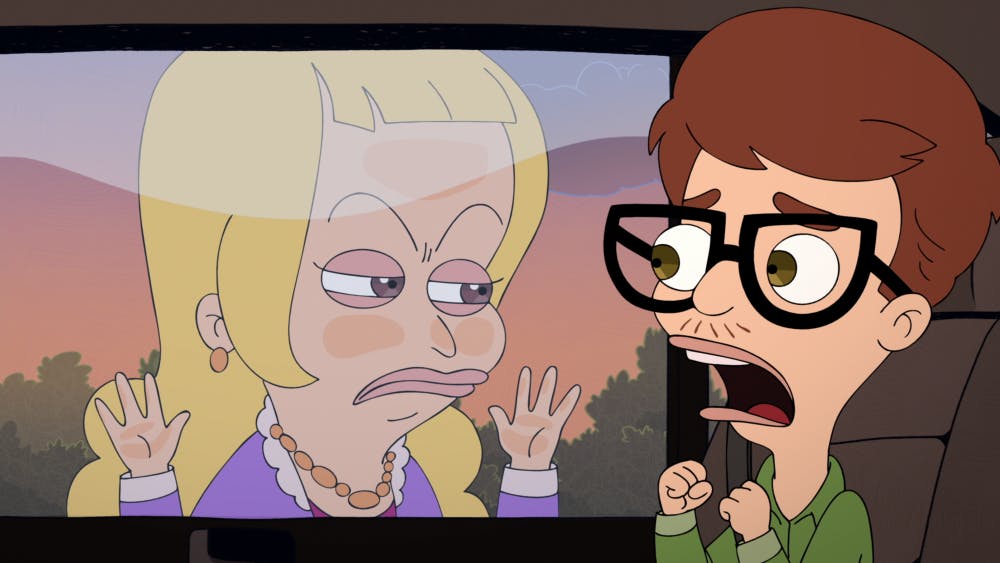Delivering a healthy dose of reality in unexpected ways is what good comedy does. It takes the truth, reimagines it along the lines of a joke, a situation, or a story, and, if timed just right, results in uncontrollable fits of laughter. Sometimes, it also makes us think, and in the case of Netflix’s Big Mouth, it makes us remember. In its second season, this animated and irreverent exploration of puberty employs absurdity to tackle real–world issues, the pain and perils of growing up, and all that adolescence can teach us about the world. What was already a successful piece of television for its sheer ability to walk a fine line of tolerable vulgarity and ridiculousness has become a lens for reflection on life’s messiness.
Big Mouth is a tough show to define. It seems to fit the criteria for most contemporary “adult cartoons,” but is centered around junior high students. Who is it for, really? Why does John Mulaney seem to voice every supporting character? Why should I, a college student attempting to claw my way out of adolescence alive, care to reflect on the very painful beginning of the end of my childhood? The effectiveness of Big Mouth needs to be seen to be believed.
At the most fundamental level, Big Mouth is a shameless, inventive second look at puberty through the lens of an absurd animated comedy. The main characters, Nick (Nick Kroll) and Andrew (John Mulaney) each struggle with a unique set of issues regarding their coming–of–age, relationships with their families, and their school lives. Their storylines weave in and out of those of the extended community of their classmates and beyond. It is from an ordinary premise that blossoms a truly strange, but ultimately rewarding piece of television. The bizarre mechanics of the imaginary Westchester County, where the lives of middle schoolers are tormented by hormone monsters and the Shame Wizard, are the driving force of the show’s comedic thrust, which is up to par with its ability to capture the timelessness of adolescence.
The first season of Big Mouth was uncompromisingly disgusting, and this is what it intended to be. There is a certain underlying shock value of the show’s no–stone–left–unturned approach that propped up its comedic jaunts. Big Mouth was, and still is, a risky show because its storylines stem from the gray area between childhood and sexual maturity. Does it ever go too far? That really depends on one’s personal sensibilities towards the coming–of–age genre. In the world of the internet, it doesn’t seem realistic to assume young teenagers exist in a sterile, censored world. Furthermore, season two justifies its approach in the material that the show tackles. It has significance beyond the scope of adolescence and resonates with the challenges of adult life.
The show’s absurdist tendencies, uncensored, in–your–face vulgarity, and offbeat musical numbers need a little getting used to. But between all the bumbling ridiculousness, Big Mouth is a thoughtful, well–written take on how a universal experience fits into the framework of modern society. In its second season, Big Mouth expands beyond the physical changes that make puberty the awkward, challenging phase of life that it is, covering the vast array of social and cultural implications of growing up. There are in–depth reflections on the feelings of loneliness and shame that infiltrate adolescent life, story arcs that address objectification, slut–shaming, and the isolation felt by those in the LGBT community, as well as wider–reaching reflections on friendship and identity.
For fans of Big Mouth’s first season, there is plenty of tangential nonsense involving sex with pillows and elaborate dick jokes to enjoy in the ten new episodes. However, beyond all that sophomoric, gut–busting fluff, Big Mouth has an eye on something truly meaningful about change and its tremendous ability to influence self–image and self–acceptance. In Big Mouth, reflecting on puberty is both a tool for comedy and for us to remember what it means to stay true to ourselves as we power through life’s great transitions.

